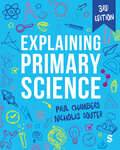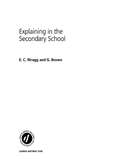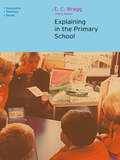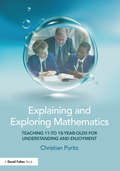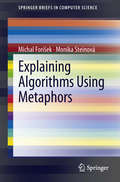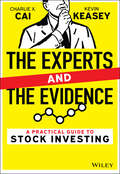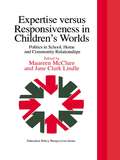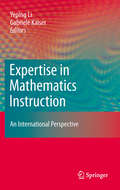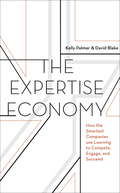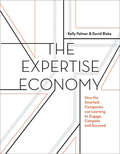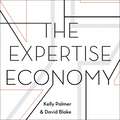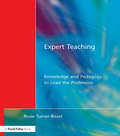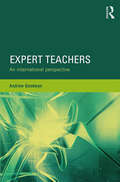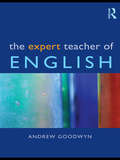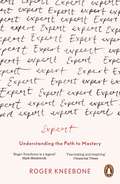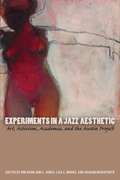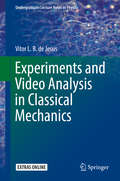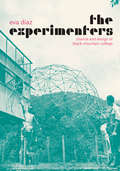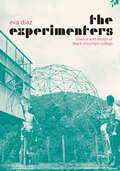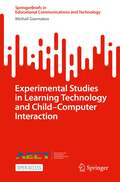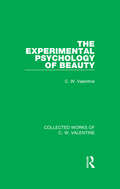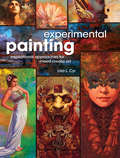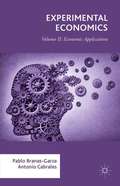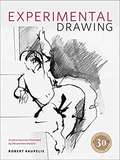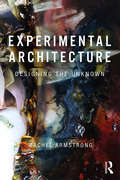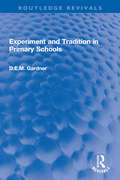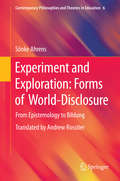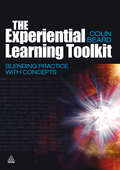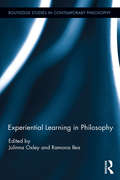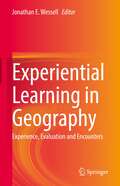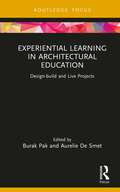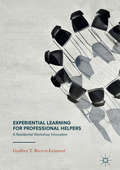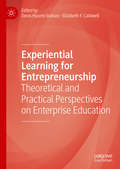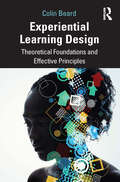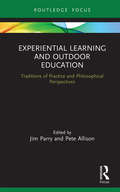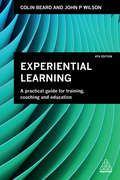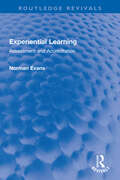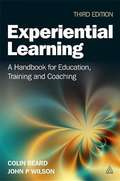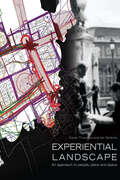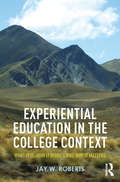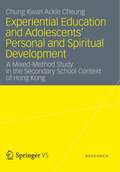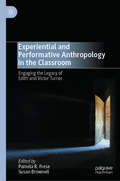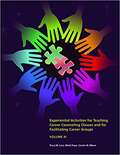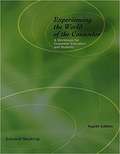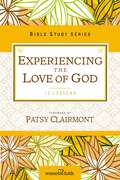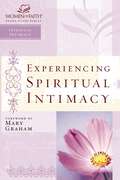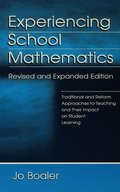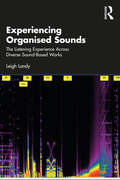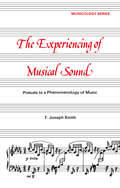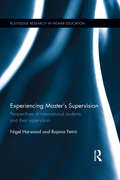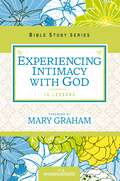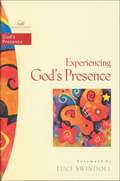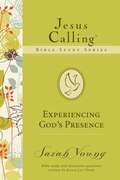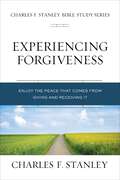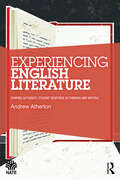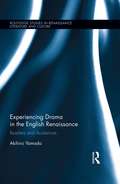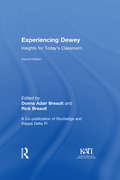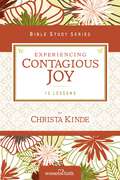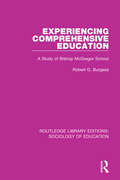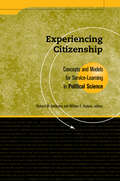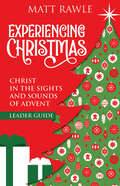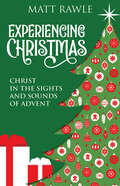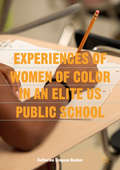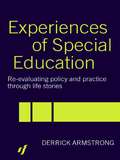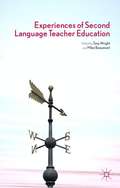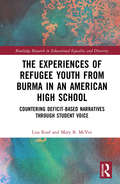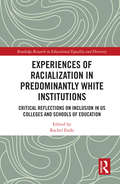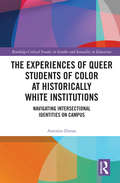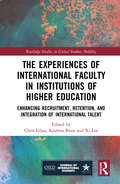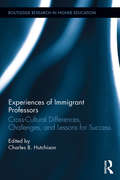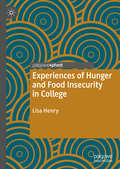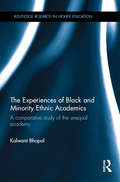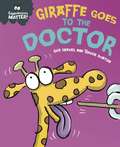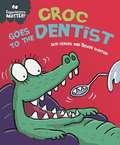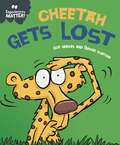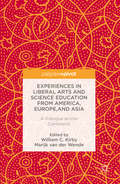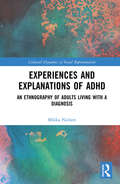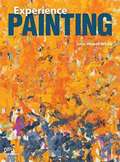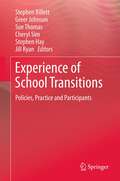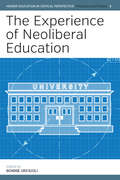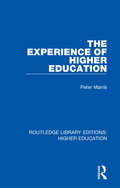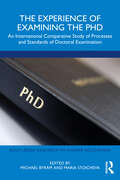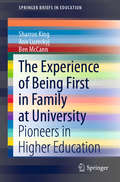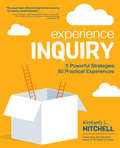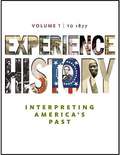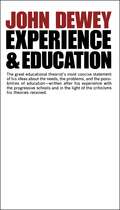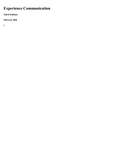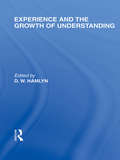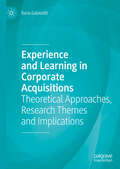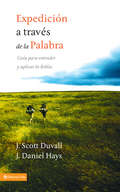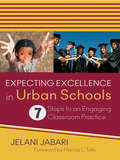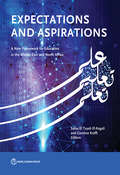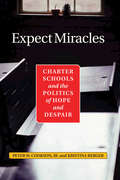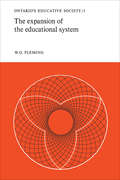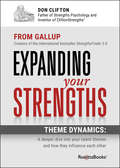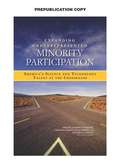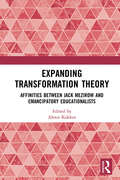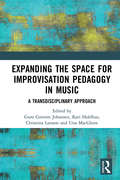- Table View
- List View
Explaining Primary Science
by Paul Chambers Nicholas SouterSuccessful science teaching in primary schools requires a careful understanding of key scientific knowledge. This book covers all the major areas of science relevant for beginning primary school teachers, explaining key concepts from the ground up, helping trainees and recently qualified teachers develop into confident science educators. This new edition comes with: An exploration of scientific misconceptions on key topics How to take action to protect the environment through primary science teaching A newly streamlined focus prioritising essential primary school subject knowledge Links to national curricula for England and Scotland Videos of useful science experiments and demonstrations for the primary classroom
Explaining in the Secondary School
by Dr George Brown Prof E WraggThis book explores strategies for building up a repertoire of ideas, approaches and techniques that allow teachers to develop effective explanatory skills. It covers issues such as the use of an appropriate language register and analogies for handling topics with which teachers might be unfamiliar.
Explaining in the Primary School (Successful Teaching Ser.)
by Ted Wragg George A BrownThis book is one of a set of eight innovative yet practical resource books for teachers, focussing on the classroom and covering vital skills for primary and secondary teachers. The books are strongly influenced by the findings of numerous research projects during which hundreds of teachers were observed at work. The first editions of the series were best sellers, and these revised second editions will be equally welcomed by teachers eager to improve their teaching skills. Ted Wragg and George Brown show what explanation is and what it aims to do. The book explores the various strategies open to teachers and, through a combination of activities and discussion points, helps them to build up a repertoire of ideas, approaches and techniques which are suitable for various situations, as well as evaluate the effectiveness of their explanations in the classroom. Along the way it covers such issues as:*the use of an appropriate language register*the place of analogies *building on children's questions*coping strategies for effective explanationThe ability to explain something clearly is a skill which effective teachers use every day. Explanation is the foundation on which the success or failure of a great deal of other forms of teaching can rest. Well done, it saves time and provides motivation. Badly done, it produces uncertainty, or even puts children off their studies.
Explaining and Exploring Mathematics: Teaching 11- to 18-year-olds for understanding and enjoyment
by Christian PuritzExplaining and Exploring Mathematics is designed to help you teach key mathematical concepts in a fun and engaging way by developing the confidence that is vital for teachers. This practical guide focuses on improving students’ mathematical understanding, rather than just training them for exams. Covering many aspects of the secondary mathematics curriculum for ages 11-18, it explains how to build on students’ current knowledge to help them make sense of new concepts and avoid common misconceptions. Focusing on two main principles to improve students’ understanding: spotting patterns and extending them to something new, and relating the topic being taught to something that the pupils already understand, this book helps you to explore mathematics with your class and establish a successful teacher-student relationship. Structured into a series of lessons, Explaining and Exploring Mathematics is packed full of practical advice and examples of the best way to answer frequently asked questions such as: Do two minuses really make a plus? Why doesn’t 3a + 4b equal 7ab? How do you get the area of a circle? Why do the angles of a triangle add up to 180°? How can you integrate 1/x and calculate the value of e? This book will be essential reading for all trainee and practising teachers who want to make mathematics relevant and engaging for their students.
Explaining Algorithms Using Metaphors
by Michal Forišek Monika SteinováThere is a significant difference between designing a new algorithm, proving its correctness, and teaching it to an audience. When teaching algorithms, the teacher's main goal should be to convey the underlying ideas and to help the students form correct mental models related to the algorithm. This process can often be facilitated by using suitable metaphors. This work provides a set of novel metaphors identified and developed as suitable tools for teaching many of the "classic textbook" algorithms taught in undergraduate courses worldwide. Each chapter provides exercises and didactic notes for teachers based on the authors' experiences when using the metaphor in a classroom setting.
The Experts and the Evidence: A Practical Guide to Stock Investing
by Charlie X. Cai Kevin KeaseyTHE EXPERTS AND THE EVIDENCE A PRACTICAL GUIDE TO STOCK INVESTING Explore and apply celebrated investing strategies with practical tools from an expert team of finance professors In The Experts and the Evidence: A Practical Guide to Stock Investing, a veteran team of finance researchers and practitioners delivers a one-of-a-kind explanation of how to use data and analytics tools to test and implement the philosophies and strategies of well-known investing experts. Combining a comprehensive discussion of the investment philosophies of renowned investors with rigorous testing and implementation, the authors provide a hands-on tool for starting and maintaining a diversified portfolio. Readers will also find: Quantitative explorations of popular investing strategies. Useful tools for systematically exploring different investment approaches. Discussions of value, growth, contrarian, portfolio, and factor investing, as well as technical analysis and advanced quantitative investing. An ideal resource for readers familiar with the basics of the financial markets and looking for a guide to a range of proven investment approaches, The Experts and the Evidence is also an essential read for advanced undergraduate and graduate students seeking a real-life informational and analytical system for the application of investment strategies.
Expertise Versus Responsiveness In Children's Worlds: Politics In School, Home And Community Relationships (Education Policy Perspectives Ser.)
by Jane ClarkFirst Published in 2004. Routledge is an imprint of Taylor & Francis, an informa company.
Expertise in Mathematics Instruction
by Yeping Li Gabriele KaiserAccumulated research findings in past decades have led to the common knowledge that teachers' professional knowledge is essential to effective classroom instruction. However, there is still very limited understanding about the nature of teachers' expertise in mathematics instruction. Expertise in Mathematics Instruction addresses this need clearly and concisely. In particular, it examines all aspects of emphases employed to characterize the nature of expertise in mathematics instruction from both researchers' and practitioners' perspectives. Moreover, with research contributions from both the East and the West, this book also examines ideas pertinent to fostering and demonstrating expertise in mathematics instruction within different system contexts. This book will raise questions and issues for mathematics education researchers to guide a critical examination of what can be learned from other education systems. Expertise in Mathematics Instruction builds on its theoretical and methodological approach with contributions from international experts in the field. Additionally, a review of related research from mathematics education serves as an introduction to the new research in both Eastern and Western settings. Concluding this resource is a reflection on the benefits of this international collaboration and possible research directions for the future. The final chapter cohesively joins traditional and current research for action. Expertise in Mathematics Instruction is of interest to researchers in mathematics education, mathematics teacher educators, and mathematics educators.
The Expertise Economy: How the Smartest Companies Use Learning to Engage, Compete and Succeed
by Kelly Palmer David BlakeThe world of work is going through a large-scale transition with digitization, automation and acceleration. Critical skills and expertise are imperative for companies and their employees to succeed in the future, and the most forward-thinking companies are being proactive in adapting to the shift in the workforce. Kelly Palmer, Silicon Valley thought-leader from LinkedIn, Degreed, and Yahoo, and David Blake, co-founder of Ed-tech pioneer Degreed, share their experiences and describe how some of the smartest companies in the world are making learning and expertise a major competitive advantage.The authors provide the latest scientific research on how people really learn and concrete examples from companies in both Silicon Valley and worldwide who are driving the conversation about how to create experts and align learning innovation with business strategy. It includes interviews with people from top companies like Google, LinkedIn, Airbnb, Unilever, NASA, and MasterCard; thought leaders in learning and education like Sal Khan and Todd Rose; as well as Thinkers50 list-makers Clayton Christensen, Daniel Pink and Whitney Johnson. The Expertise Economy dares you to let go of outdated and traditional ways of closing the skills gap, and challenges CEOs and business leaders to embrace the urgency of re-skilling and upskilling the workforce.
The Expertise Economy: How the smartest companies use learning to engage, compete, and succeed
by Kelly Palmer David BlakeThe workplace is going through a large-scale transition with digitization, automation, and acceleration. Critical skills and expertise are imperative for companies and their employees to succeed in the future, and the most forward-thinking companies are being proactive in adapting to the shift in the workforce. Kelly Palmer, Silicon Valley thought-leader from LinkedIn, Degreed, and Yahoo, and David Blake, co-founder of Ed-tech pioneer Degreed, share their experiences and describe how some of the smartest companies in the world are making learning and expertise a major competitive advantage.The authors provide the latest scientific research on how people really learn and concrete examples from companies in both Silicon Valley and worldwide who are driving the conversation about how to create experts and align learning innovation with business strategy. It includes interviews with people from top companies like Google, LinkedIn, Airbnb, Unilever, NASA, and MasterCard; thought leaders in learning and education like Sal Khan and Todd Rose; as well as Thinkers50 list-makers Clayton Christensen, Daniel Pink, and Whitney Johnson. The Expertise Economy dares you to let go of outdated and traditional ways of closing the skills gap, and challenges CEOs and business leaders to embrace the urgency of re-skilling and upskilling the workforce.
The Expertise Economy: How the Smartest Companies Use Learning to Engage, Compete and Succeed
by Kelly Palmer David BlakeDrawing on the science of how we learn, The Expertise Economy shows companies big and small how to transform their employees into experts and ultimately their biggest competitive advantage.The world of work is going through a large-scale transition with digitization, automation and acceleration. Critical skills and expertise are imperative for companies and their employees to succeed in the future, and the most forward-thinking companies are being proactive in adapting to the shift in the workforce. Kelly Palmer, Silicon Valley thought-leader from LinkedIn, Degreed, and Yahoo, and David Blake, co-founder of Ed-tech pioneer Degreed, share their experiences and describe how some of the smartest companies in the world are making learning and expertise a major competitive advantage.The authors provide the latest scientific research on how people really learn and concrete examples from companies in both Silicon Valley and worldwide who are driving the conversation about how to create experts and align learning innovation with business strategy. It includes interviews with people from top companies like Google, LinkedIn, Airbnb, Unilever, NASA, and MasterCard; thought leaders in learning and education like Sal Khan and Todd Rose; as well as Thinkers50 list-makers Clayton Christensen, Daniel Pink and Whitney Johnson. The Expertise Economy dares you to let go of outdated and traditional ways of closing the skills gap, and challenges CEOs and business leaders to embrace the urgency of re-skilling and upskilling the workforce.(P)2018 Hodder & Stoughton Limited
Expert Teaching: Knowledge and Pedagogy to Lead the Profession
by Rosie Bisset TurnerThis book is aimed at teachers who wish to improve their professional practice and will help them to think about current practice, not only in terms of skills and competences to be developed, but also areas of knowledge to be enriched. The model of knowledge bases presented is a valuable framework for reflecting on practice and for analyzing professional development needs. The book is therefore an ideal text for teachers taking courses that may lead towards an advanced qualification in teaching or who are undertaking in-service training and action research programs. Teachers approaching 'threshold assessment' will find the book useful in reflecting on the quality of their teaching.
Expert Teachers: An international perspective (The\expert Teacher Ser.)
by Andrew GoodwynExpert Teachers is a compelling book that explores issues surrounding the concept of the expert teacher from a truly international perspective. Expert teaching, a global phenomenon that exerts significant influence on education policy and practice, has developed rapidly since the 1980s and significantly impacted many teachers’ careers. As a result, this book poses pertinent and important questions scrutinising the topic as well as considering possibilities for future models. The book reviews and expands upon issues such as: What does it mean to be an ‘expert’ teacher? What have been the most successful models of expert teaching? Is rewarding a minority of the ‘best’ teachers a sustainable method of raising standards? What is the role of expertise in furthering the aim to make teaching a ‘top tier’ career? What are the dominant and emerging models of expert teaching globally? What ways can we expect models of expert teaching to develop in the future? With case studies of specific systems, and analyses of the issues and context therein, this book offers an exceptional insight into the effects of expert teaching models – their effects on the teacher as an individual as well as standards and education policy internationally. The book argues that the current focus on pursuing misleading high-stakes test scores is underserving the teaching profession and that instead the focus for expert teaching should be grounded in issues of social justice and community wellbeing. This book will appeal greatly to current teachers, those currently undertaking teacher training and students or academics carrying out research in the field of teacher education, professional development and expertise.
The Expert Teacher of English
by Andrew GoodwynThe Expert Teacher of English is for all passionate teachers – both novice and expert - who aspire to become outstanding professionals. It considers what we mean by ‘expert’ and ‘expertise’, explores concepts that are vital to understanding what expertise in teaching is ‘for’, and discusses the characteristics of excellent teaching. As increasing attention is being paid to the concept of the professional who can model excellent teaching and mentor and develop others, it provides a critical analysis of The Advanced Skills Teacher and the Excellent Teacher, as well as the Chartered Teacher in Scotland and the ‘highly accomplished teacher’ in the US. Ideas and issues considered include: The nature of English as a school subject What it means to be part of a profession Curriculum design, lesson planning and assessment Opportunities for technologies in the English classroom Working collaboratively with colleagues, mentoring and observation Continuing professional development and research Drawing on the views, ideas and experiences of a group of skilful teachers, The Expert Teacher of English aims to stimulate personal and professional development, help you reflect on the concept of expertise, and support you as you develop as a highly accomplished teacher.
Expert: Understanding the Path to Mastery
by Roger Kneebone'Roger Kneebone is a legend' Mark Miodownik, author of Stuff Matters'Fascinating and inspiring' Financial Times'The pandemic has made the necessity of relying on experts evident to all . . . this is a rich exploration of lifelong learning' GuardianWhat could a lacemaker have in common with vascular surgeons? A Savile Row tailor with molecular scientists? A fighter pilot with jazz musicians? At first glance, very little. But Roger Kneebone is the expert on experts, having spent a lifetime finding the connections.In Expert, he combines his own experiences as a doctor with insights from extraordinary people and cutting-edge research to map out the path we're all following - from 'doing time' as an Apprentice, to developing your 'voice' and taking on responsibility as a Journeyman, to finally becoming a Master and passing on your skills. As Kneebone shows, although each outcome is different, the journey is always the same. Whether you're developing a new career, studying a language, learning a musical instrument or simply becoming the person you want to be, this ground-breaking book reveals the path to mastery.
Experiments in a Jazz Aesthetic
by Omi Osun Joni L. Jones Lisa L. Moore Sharon BridgforthIn Austin, Texas, in 2002, a group of artists, activists, and academics led by performance studies scholar Omi Osun Joni L. Jones formed the Austin Project (tAP), which meets annually in order to provide a space for women of colour and their allies to build relationships based on trust, creativity, and commitment to social justice by working together to write and perform work in the jazz aesthetic. Inspired by this experience, this book is both an anthology of new writing and a sourcebook for those who would like to use creative writing and performance to energize their artistic, scholarly, and activist practices. Theoretical and historical essays by Omi Osun Joni L. Jones describe and define the African American tradition of art-making known as the jazz aesthetic, and explain how her own work in this tradition inspired her to start tAP. Key artists in the tradition, from Bessie Award-winning choreographer Laurie Carlos and writer/performer Robbie McCauley to playwrights Daniel Alexander Jones and Carl Hancock Rux, worked with the women of tAP as mentors and teachers. This book brings together never-before-published, must-read materials by these nationally known artists and the transformative writing of tAP participants. A handbook for workshop leaders by Lambda Literary Award-winning writer Sharon Bridgforth, tAP's inaugural anchor artist, offers readers the tools for starting similar projects in their own communities. A full-length script of the 2005 tAP performance is an original documentation of the collaborative, breath-based, body work of the jazz aesthetic in theatre, and provides both a script for use by theatre artists and an invaluable documentation of a major transformative movement in contemporary performance.
Experiments and Video Analysis in Classical Mechanics (Undergraduate Lecture Notes in Physics)
by Vitor L. B. de JesusThis book is an experimental physics textbook on classical mechanics focusing on the development of experimental skills by means of discussion of different aspects of the experimental setup and the assessment of common issues such as accuracy and graphical representation. The most important topics of an experimental physics course on mechanics are covered and the main concepts are explored in detail. Each chapter didactically connects the experiment and the theoretical models available to explain it. Real data from the proposed experiments are presented and a clear discussion over the theoretical models is given. Special attention is also dedicated to the experimental uncertainty of measurements and graphical representation of the results. In many of the experiments, the application of video analysis is proposed and compared with traditional methods.
The Experimenters: Chance and Design at Black Mountain College
by Eva DíazIn the years immediately following World War II, Black Mountain College, an unaccredited school in rural Appalachia, became a vital hub of cultural innovation. Practically every major artistic figure of the mid-twentieth century spent some time there: Merce Cunningham, Ray Johnson, Franz Kline, Willem and Elaine de Kooning, Robert Motherwell, Robert Rauschenberg, Dorothea Rockburne, Aaron Siskind, Cy Twombly--the list goes on and on. Yet scholars have tended to view these artists’ time at the College as little more than prologue, a step on their way to greatness. With The Experimenters, Eva Díaz reveals the importance of Black Mountain College--and especially of three key teachers, Josef Albers, John Cage, and R. Buckminster Fuller--to be much greater than that. Díaz’s focus is on experimentation. Albers, Cage, and Fuller, she shows, taught new models of art making that favored testing procedures rather than personal expression. These methodologies represented incipient directions for postwar art practice, elements of which would be sampled, and often wholly adopted, by Black Mountain students and subsequent practitioners. The resulting works, which interrelate art and life in a way that imbues these projects with crucial relevance, not only reconfigured the relationships among chance, order, and design--they helped redefine what artistic practice was, and could be, for future generations. Offering a bold, compelling new angle on some of the most widely studied creative figures of modern times, The Experimenters does nothing less than rewrite the story of art in the mid-twentieth century.
The Experimenters: Chance and Design at Black Mountain College
by Eva DíazIn the years immediately following World War II, Black Mountain College, an unaccredited school in rural Appalachia, became a vital hub of cultural innovation. Practically every major artistic figure of the mid-twentieth century spent some time there: Merce Cunningham, Ray Johnson, Franz Kline, Willem and Elaine de Kooning, Robert Motherwell, Robert Rauschenberg, Dorothea Rockburne, Aaron Siskind, Cy Twombly—the list goes on and on. Yet scholars have tended to view these artists’ time at the College as little more than prologue, a step on their way to greatness. With The Experimenters, Eva Díaz reveals the importance of Black Mountain College—and especially of three key teachers, Josef Albers, John Cage, and R. Buckminster Fuller—to be much greater than that. Díaz’s focus is on experimentation. Albers, Cage, and Fuller, she shows, taught new models of art making that favored testing procedures rather than personal expression. These methodologies represented incipient directions for postwar art practice, elements of which would be sampled, and often wholly adopted, by Black Mountain students and subsequent practitioners. The resulting works, which interrelate art and life in a way that imbues these projects with crucial relevance, not only reconfigured the relationships among chance, order, and design—they helped redefine what artistic practice was, and could be, for future generations. Offering a bold, compelling new angle on some of the most widely studied creative figures of modern times, The Experimenters does nothing less than rewrite the story of art in the mid-twentieth century.
Experimental Studies in Learning Technology and Child–Computer Interaction (SpringerBriefs in Educational Communications and Technology)
by Michail GiannakosThis book is about the ways in which experiments can be employed in the context of research on learning technologies and child–computer interaction (CCI). It is directed at researchers, supporting them to employ experimental studies while increasing their quality and rigor. The book provides a complete and comprehensive description on how to design, implement, and report experiments, with a focus on and examples from CCI and learning technology research. The topics covered include an introduction to CCI and learning technologies as interdisciplinary fields of research, how to design educational interfaces and visualizations that support experimental studies, the advantages and disadvantages of a variety of experiments, methodological decisions in designing and conducting experiments (e.g. devising hypotheses and selecting measures), and the reporting of results. As well, a brief introduction on how contemporary advances in data science, artificial intelligence, and sensor data have impacted learning technology and CCI research is presented. The book details three important issues that a learning technology and CCI researcher needs to be aware of: the importance of the context, ethical considerations, and working with children. The motivation behind and emphasis of this book is helping prospective CCI and learning technology researchers (a) to evaluate the circumstances that favor (or do not favor) the use of experiments, (b) to make the necessary methodological decisions about the type and features of the experiment, (c) to design the necessary “artifacts” (e.g., prototype systems, interfaces, materials, and procedures), (d) to operationalize and conduct experimental procedures to minimize potential bias, and (e) to report the results of their studies for successful dissemination in top-tier venues (such as journals and conferences).This book is an open access publication.
The Experimental Psychology of Beauty: The Experimental Psychology Of Beauty (Collected Works of C.W. Valentine)
by C.W. ValentineOriginally published in 1962, the experimental study of aesthetics was a field particularly associated with the name of C.W. Valentine, who in this book provided a critical review of research carried out since the end of the nineteenth century principally by British and American psychologists. The investigations described, many of them conducted by the author, are concerned with individual responses to what is commonly regarded as beautiful in painting, music, and poetry, an important distinction being made between the perception of objects as ‘beautiful’ as opposed to ‘pleasing’. The reactions of children and adults, and of people having different ethnic and social backgrounds, are explored in a variety of experiments dealing with specific elements, including colour, form, and balance in painting; musical intervals, discord, harmony, melody, and tempo; and rhythm, metre, imagery, and associations in classical and romantic poetry. Other experiments seek to disclose the temperamental and attitudinal factors underlying individual differences in the judgement and appreciation of specific works of art. Of particular interest are the studies of responses to modern paintings, poems and musical compositions. The findings throw light on the development of discrimination and taste and suggest the possibility of some common factor in the appreciation of these three arts. It was felt that critics as well as psychologists and aestheticians would find much to encourage reflection and to stimulate further research.
Experimental Painting: Inspirational Approaches for Mixed Media Art
by Lisa L. CyrWith page after page of stimulating possibilities, this book guides you on an uncompromising journey to visually dynamic, conceptually provocative, utterly original art. Embrace the spirit of creative play, break out of your comfort zone, and take your art to a whole new level. In her follow-up to the popular Art Revolution, Lisa L. Cyr delves deeper into an inspiring range of two and three-dimensional mixed-media techniques. Discover fresh, alternative ways to apply and manipulate painting media, transform surfaces, and create distinctive, message-driven work. Inside you'll find: A wide array of unconventional tools, materials and processes that help artists blaze their own unique and creative paths 12 step-by-step demonstrations highlighting specific experimental techniques, including freeform painting, making custom tools, and building dimension into a surface with inlaid boxes 3 feature demonstrations showing mixed-media processes at play in the creation of original artworks, from concept to completion A chapter on creative self-promotion revealing the latest marketing and presentation strategies for the working artist
Experimental Drawing: Creative Exercises Illustrated By Old And New Masters
by Robert KaupelisAs with most art forms, it's best to comprehend traditional drawing techniques before you break the rules. But once you've mastered the basics, you may find that you gravitate to more abstract ways of rendering everything from still lifes to figures. However, this book is not only about avant-garde style; it is experimental in that it forces the artist out of his or her comfort zone, whatever that might be. In this book, renowned New York University professor, Robert Kaupelis, shares the tutorials that he used with his students, offering illustrations of drawings and paintings from old masters to contemporary artists (and even some outstanding works from his students) to explain techniques. Covering everything from creating form through contour drawings to drawing with new technology, Experimental Drawing helps you zero in on concepts and form ideas that may take your work to a new and more intriguing level. Some of the innovative exercises you'll find here include: • Drawing models while blindfolded • Engaging in group drawing sessions popularized during the Dada era • Utilizing different drawing materials like glass, plastic, feathers, string, sponges, metal dust, and more • Reducing a post's brushstroke from six to one • Using cross-contour lines for a more abstract still life • Integrating a grid system on a carefully rendered scene to create an illusion of distorted space and movement • And much more... This classic volume's inventive and stimulating projects will help serious artists develop their own vision and their own way to draw. Includes more than 200 spectacular drawings by old and modern masters from Michelangelo to Jasper Johns.
Experimental Architecture: Designing the Unknown
by Rachel ArmstrongIn this ground-breaking book, the first to provide an overview of the theory and practice of experimental architecture, Rachel Armstrong explores how interdisciplinary, design-led research practices are beginning to redefine the possibilities of architecture as a profession. Drawing on experts from disciplines as varied as information technology, mathematics, poetry, graphic design, scenography, bacteriology, marine applied science and robotics, Professor Armstrong delineates original, cutting-edge architectural experiments through essays, quotes, poetry, equations and stories. Written by an acknowledged pioneer of architectural experiment, this visionary book is ideal for students and researchers wishing to engage in experimental, practice-based architectural and artistic research. It introduces radical new ideas about architecture and provides ideas and inspiration which students and researchers can apply in their own work and proposals, while practitioners can draw on it to transform their creative assumptions and develop thereby a distinctive "edge" to stand out in a highly competitive profession.
Experiment and Tradition in Primary Schools (Routledge Revivals)
by D.E.M. GardnerFirst published in 1966, Experiment and Tradition in Primary Schools was written to provide an account of the author’s pioneering study of the attainment of young children in schools where the curriculum was shaped by their spontaneous interests. The book describes the findings of Gardner’s work and assesses them in detail. It will have lasting relevance for those with an interest in the history of education and the development of education in infant and junior schools.
Experiment and Exploration: Forms of World-Disclosure
by Sönke AhrensThis book deals with contemporary epistemological questions, connecting Educational Philosophy with the field of Science- and Technology Studies. It can be understood as a draft of a general theory of world-disclosure, which is in its core a distinction between two forms of world-disclosure: experiment and exploration. These two forms have never been clearly distinguished before. The focus lies on the experimental form of world-disclosure, which is described in detail and in contrast to the explorational form along the line of twenty-one characteristics, which are mainly derived from empirical studies of experimental work in the field of natural sciences. It can also be understood as an attempt to integrate elements of the Anglo-Saxon Philosophy of Science with elements of the German tradition of Educational Philosophy. This is also reflected in the style of writing. In accordance to the content-level of the book, the argument for experimental forms of world-disclosure is written in an essayistic, readable style, which can be understood as an experimental form of writing. This book is a translation of the doctoral thesis 'Experiment und Exploration. Bildung als experimentelle Form der Welterschließung' (summa cum laude). The thesis was published in German in 2010 by Transcript (Bielefeld) in the series called 'Theorie Bilden', edited by Prof. Dr. Hannelore Faulstich-Wieland, Prof. Dr. Hans-Christoph Koller, Prof. Dr. Karl-Josef Pazzini and Prof. Dr. Michael Wimmer.
The Experiential Learning Toolkit
by Colin BeardThe Experiential Learning Toolkit presents a diverse range of practical exercises, which are based on the theory of experiential learning. Experiential learning is concerned with learning through direct experience, which aims to create more effective, engaging and embedded learning. Each activity presented includes a description of the underlying principles, practical information on delivering the exercise as well as tips and further reading. The exercises cover a range of training needs including; effective customer service, telephone skills, applying strategic thinking, and developing creativity. Trainers will find this an invaluable resource, with fresh approaches which engage and inspire learners.
Experiential Learning in Philosophy: Philosophy Without Walls (Routledge Studies in Contemporary Philosophy)
by Julinna Oxley Ramona IleaIn this volume, Julinna Oxley and Ramona Ilea bring together essays that examine and defend the use of experiential learning activities to teach philosophical terms, concepts, arguments, and practices. Experiential learning emphasizes the importance of student engagement outside the traditional classroom structure. Service learning, studying abroad, engaging in large-scale collaborative projects such as creating blogs, websites and videos, and practically applying knowledge in a reflective, creative and rigorous way are all forms of experiential learning. Taken together, the contributions to Experiential Learning in Philosophy argue that teaching philosophy is about doing philosophy with others. The book is divided into two sections: essays that engage in the philosophical debate about defining and implementing experiential learning, and essays that describe how to integrate experiential learning into the teaching of philosophy. Experiential Learning in Philosophy provides a timely reflection on best practices for teaching philosophical ideals and theories, an examination of the evolution of the discipline of philosophy and its adoption (or reclamation) of active modes of learning, and an anticipation of the ways in which pedagogical practices will continue to evolve in the 21st century.
Experiential Learning in Geography: Experience, Evaluation and Encounters
by Jonathan E. WessellThis book provides insight into the importance and impacts that experiential learning has in geographic education by examining the experience, the methods of evaluation, and the encounters that students have shared about their experiences. It allows the reader to gain insight into what it really takes to prepare and lead students in such experiences both domestically and internationally. The book can be used as a guide to planning, but also demonstrates the use of experiential learning theory throughout these experiences and especially the importance of reflection by the students on what they are experiencing. The book is beneficial to students and faculty alike that are studying geography education.
Experiential Learning in Architectural Education: Design-build and Live Projects (Routledge Focus on Design Pedagogy)
by Aurelie De Smet Burak PakThis book is designed to be of interest to many different audiences due to its cross-sectoral and transdisciplinary content. It will appeal to those within architectural higher education as well as to spatial practitioners, students, civic and governmental organizations engaged in socio-spatial projects. The book is (1) an academic source of critical and practice-driven knowledge on experiential architectural design learning, (2) provides methods for other ways of learning in the form of design-build and live projects and (3) offers design inspiration for community-engaged spatial practices relevant to both educators and practising architects and designers.
Experiential Learning for Professional Helpers
by Godfrey T. Barrett-LennardThis book describes in considerable depth and detail a series of workshops in therapeutic counselling in the early 1960s, for people working in social or mental health care who wished to expand their skillset and capabilities. The book is unique in its comprehensive retrospective viewpoint of the effect of these workshops: rather than merely adopting an objective stance by describing the processes, structures and impacts of intensive group work, the book invites us into the initial conversations in the room, and then follows the group members back into their lives, allowing us to see the longer term impact of participation some ten years later. Finally, Barrett-Lennard reflects on the group, and on the history of the profession more generally, and makes a compelling argument that the foundations of the group and the participants' motivation for fully participating in such an intensive process are as powerful today as they were in the 1960s. The blend of qualitative and long-term data is genuinely unique, and the work provides a valuable insight into the history of therapeutic counselling and training. It will be of great interest to students and scholars of psychology and psychotherapy, as well as practising therapists and trainees who want to do meaningful work with their client groups.
Experiential Learning for Entrepreneurship: Theoretical and Practical Perspectives on Enterprise Education
by Denis Hyams-Ssekasi Elizabeth F. CaldwellThis topical new book provides an illuminating overview of enterprise education, and poses the question as to whether current establishments have adequate systems in place to prepare students for the world of work. Addressing the increasing need for graduates with practical skills and expertise in the labour market, this collection of insightful chapters analyses the opportunities that are available for aspiring entrepreneurs to develop enterprise skills and experience key aspects of starting and running a business, whilst in a supported environment such as an educational program or incubator scheme. With comprehensive discussion of higher education initiatives and empirical examples of experiential learning in the workplace, this book is an important and timely read for those researching business enterprise, entrepreneurship and higher education more generally.
Experiential Learning Design: Theoretical Foundations and Effective Principles
by Colin BeardExperiential Learning Design comprehensively demonstrates the key theories and applications for the design of experiential approaches to learning and training. Learning is gradually moving away from management and delivery of content, and toward experiences that encourage learners to engage and take greater responsibility for their own progress. This book’s empirically sound, multi-disciplinary approach balances technical-rational and artistic-intuitive design elements to accommodate the complex, fluctuating capacities of human learning. In-depth chapters cover design principles, social and environmental factors in learning, the importance of senses and emotions, and links between body and brain. This bold, unique perspective shift will enrich the work of learning scientists, instructional designers, educational technologists, and beyond.
Experiential Learning and Outdoor Education: Traditions of practice and philosophical perspectives
by Jim Parry Pete AllisonThis book adds to the theoretical development of the emerging fields of experiential learning and outdoor education by examining the central concept, 'experience', and interrogating a central claim of experiential learning: whether, and if so how, a short-term singular experience can transform a participant’s life as a whole and in a permanent way. While such a possibility has been corroborated by the personal testimonies of participants, and the activities of instructors over many years, the book argues that we must go beyond this kind of ‘evidence’. In comparing Anglophone and continental approaches and drawing on the work of Dewey, Dilthey and Merleau-Ponty in the philosophy of experience, Experiential Learning and Outdoor Education presents the first detailed review of the concept of ‘experience’ in European philosophy, as applied to outdoor experiential learning. A vital insight into the field, this is important reading for students and researchers working in the philosophy of sport, and pedagogical theory, especially in areas relating to the outdoors, but also to experiential education more generally.
Experiential Learning: A Practical Guide for Training, Coaching and Education
by Colin Beard John P. WilsonIn a fast-paced and innovative world, traditional training methods can no longer be relied on to improve performance, engagement or promote behavioural change. Experience-based learning is more affordable, appealing and effective than ever before. Experiential Learning combines in-depth theory with international case studies from companies including Interface, Shell and the UK National Health Service (NHS) and numerous practical tools to consider when developing and delivering learning experiences in either for-profit or not-for-profit organizations. It presents a simple model, the Learning Combination Lock, which enables trainers, coaches, facilitators and educators to select the best strategies for their circumstances to maximize comprehension, knowledge retention and application. Essential reading for anyone designing and delivering learning experiences, it covers experiential learning activities, experience and intelligence, coaching and facilitation, best practice and ethics, learning environments (both indoor and outdoor) and working with the senses and emotions to help promote behavioural change.In addition to featuring new international case studies, this fully revised 4th edition of Experiential Learning considers how to develop positive habits for learning, covers the mechanisms that help people to learn and the reviewing and reflection process. It also explores the topics of gamification, 3D learning and virtual reality. Online supporting resources include audio files that introduce sensory intelligence.
Experiential Learning: Assessment and Accreditation (Routledge Revivals)
by Norman EvansFirst published in 1992, Experiential Learning was written to explore in detail the ways in which the assessment and accreditation of prior and current experiential learning (APEL) was being practised in higher education, further education, community and voluntary provision, training organisations and employment, in provision for the unemployed, youth training schemes, and for updating and retraining. The book argues that individuals can be encouraged and motivated to learn if they are enabled to develop a due sense of their own capacity to learn. It looks at the background of APEL in Britain, and explores its progression into a day-to-day concern for policy-makers and providers of formal courses and training and development programmes in many sectors. It also considers how APEL can be used alongside other economic and social developments to improve the organisation and the provision of opportunities for learning at the post-secondary stage. Experiential Learning will appeal to those with an interest in the history and theory of the assessment and accreditation of experiential learning.
Experiential Learning
by John P. Wilson Colin BeardExperiential Learning enables educators, trainers, coaches and facilitators to unleash some of the more potent ingredients of learning through experience. It presents a simple model: the Learning Combination Lock, which illustrates the wide range of factors that can be altered to enhance the learning experience. The theory is brought to life with hundreds of examples from around the world and covers issues such as: experience and intelligence; facilitation, good practice and ethics; learning environments; experiential learning activities; and working with the senses and emotions. Experiential Learning offers the skills that can be successfully applied to a variety of settings including management education, corporate training, team-building, youth-development work, counselling and therapy, schools and higher education and special needs training. This fully updated third edition includes guidance for coaches, cutting edge new material on sensory intelligence and updated models, tools and case studies throughout.
Experiential Landscape: An Approach to People, Place and Space
by Kevin Thwaites Ian SimkinsExperiential Landscape offers new ways of looking at the relationship between people and the outdoor open spaces they use in their everyday lives. The book takes a holistic view of the relationship between humans and their environment, integrating experiential and spatial dimensions of the outdoors, and exploring the theory and application of environmental design disciplines, most notably landscape architecture and urban design. The book explores specific settings in which an experiential approach has been applied, setting out a vocabulary and methods of application, and offers new readings of experiential characteristics in site analysis and design. Offering readers a range of accessible mapping tools and details of what participative approaches mean in practice, this is a new, innovative and practical methodology. The book provides an invaluable resource for students, academics and practitioners and anyone seeking reflective but practical guidance on how to approach outdoor place-making or the analysis and design of everyday outdoor places.
Experiential Education in the College Context: What it is, How it Works, and Why it Matters
by Jay W. RobertsExperiential Education in the College Context provides college and university faculty with pedagogical approaches that engage students and support high-impact learning. Organized around four essential categories—active learning, integrated learning, project-based learning, and community-based learning—this resource offers examples from across disciplines to illustrate principles and best practices for designing and implementing experiential curriculum in the college and university setting. Framed by theory, this book provides practical guidance on a range of experiential teaching and learning approaches, including internships, civic engagement, project-based research, service learning, game-based learning, and inquiry learning. At a time when rising tuition, consumer-driven models, and e-learning have challenged the idea of traditional liberal education, this book provides a compelling discussion of the purposes of higher education and the role experiential education plays in sustaining and broadening notions of democratic citizenship. .
Experiential Education and Adolescents’ Personal and Spiritual Development
by Chung Kwan CheungAdventure-based programs have become prevailing in the schools in Hong Kong. Due to the little empirical examination to the frequent use of experiential education, Chung Kwan Ackie Cheung uses mixed methods to establish its first phenomenal picture, addressing the scale of the use of experiential education and the impact of it on adolescents' development with regard to the globalizing phenomenon of Hong Kong. The findings show that experiential education, esp. adventure-based program, has been widely-spread and there is positive impact in the specified aspects self-concept, self-efficacy, learning climate and spiritual dimension of its adolescent learners.
Experiential and Performative Anthropology in the Classroom: Engaging the Legacy of Edith and Victor Turner
by Pamela R. Frese Susan BrownellThe contributors gathered here revitalize “ethnographic performance”—the performed recreation of ethnographic subject matter pioneered by Victor and Edith Turner and Richard Schechner—as a progressive pedagogy for the 21st century. They draw on their experiences in utilizing performances in a classroom setting to facilitate learning about the diversity of culture and ways of being in the world. The editors, themselves both students of Turner at the University of Virginia, and Richard Schechner share recollections of the Turners’ vision and set forth a humanistic pedagogical agenda for the future. A detailed appendix provides an implementation plan for ethnographic performances in the classroom.
Experiential Activities for Teaching Career Counseling Classes and for Facilitating Career Groups
by Tracy M. Lara Mark Pope Carole W. MinorThe experiential activities in this book are an invaluable tool in the counseling field. It is a comprehensive and didactic approach to career counseling for the counselor educator. Each chapter is well organized in clearly stating purpose, learning objectives, application of theory, target population, setting, materials needed and instructions. The content identifies key areas in career counseling consisting of theoretical orientations in counselor education development, assessment tools, pragmatic exercises and technological resources. The self-knowledge exercises help the counselor educator in resolving one's ambivalence in making sound career choices.
Experiencing the World of the Counselor: A Workbook for Counselor Educators and Students
by Edward NeukrugFilled with experiential exercises; vignettes on ethical, professional, and legal issues; self-assessment techniques; and other self-awareness activities, the workbook offers you an opportunity to examine your own life as you weave through the chapters.
Experiencing the Love of God (Women of Faith Study Guide Series)
by Women Of Faith ClairmontWe see love everywhere. It binds husbands and wives, parents and children, brothers and sisters, and close friends. But all the love we experience in this world pales by comparison to the love God has shown to us. This was a love so profound that He "gave His only begotten Son, that whoever believes in Him should not perish" (John 3:16). In Experiencing the Love of God, you will look at key passages in Scripture that talk about the divine love that God has for you. You will see how the Bible is really a love story, for God--your Hero--was so determined to be with you that He went to incredible lengths to save you. One day, He will return for you and take you to the home He has prepared! God's love is truly unparalleled, and all He asks is that you receive it! The Women of Faith® Bible Studies provide intriguing insights into topics that are relevant to women's lives today. Each guide includes twelve weeks of study, down-to-earth illustrations, and reflections to help you move the truth from your head to your heart. A leader's guide for use with small groups is also included.
Experiencing Spiritual Intimacy: Women of Faith Study Guide Series (Women of Faith Study Guide Series)
by Christa KindeWomen of Faith, renowned for their unique combination of personality and truth, offer fresh new messages in their fourth series of popular topical study guides. Titles include:Receiving God's GoodnessExperiencing Spiritual IntimacyContagious JoyUnderstanding PurposeEach study guide, teeming with insights and quotes from the conference speakers provides twelve weeks of Bible study, a leader's guide for small groups, and a special take-home reminder for each week's lesson.
Experiencing School Mathematics: Traditional and Reform Approaches To Teaching and Their Impact on Student Learning, Revised and Expanded Edition (Studies in Mathematical Thinking and Learning Series)
by Jo BoalerNORTH AMERICAN RIGHTS ONLY: This is a revised edition of Experiencing School Mathematics first published in 1997 by Open University Press, © Jo Boaler. This revised edition is for sale in North America only.The first book to provide direct evidence for the effectiveness of traditional and reform-oriented teaching methods, Experiencing School Mathematics reports on careful and extensive case studies of two schools that taught mathematics in totally different ways. Three hundred students were followed over three years, providing an unusual and important range of data, including observations, interviews, questionnaires, and assessments, to show the ways students' beliefs and understandings were shaped by the different approaches to mathematics teaching. The interviews that are reproduced in the book give compelling insights into what it meant to be a student in the classrooms of the two schools. Questions are raised about and new evidence is provided for: * the ways in which "traditional" and "reform oriented" mathematics teaching approaches can impact student attitude, beliefs, and achievement; *the effectiveness of different teaching methods in preparing students for the demands of the "real world" and the 21st century; *the impact of tracking and heterogeneous ability grouping; and *gender and teaching styles--the potential of different teaching approaches for the attainment of equity. The book draws some radical new conclusions about the ways that traditional teaching methods lead to limited forms of knowledge that are ineffective in non-school settings. This edition has been revised for the North American market to show the relevance of the study results in light of the U.S. reform movement, the "math wars" and debates about teachers, assessment, and tracking. The details of the study have been rewritten for an American audience and the results are compared with research conducted in the U.S. This is an important volume for mathematics teachers and researchers, education policymakers, and for students in mathematics education courses. NOTE: This is a revised edition of Experiencing School Mathematics first published in 1997 by Open University Press, © Jo Boaler. This revised edition is for sale in North America only.
Experiencing Organised Sounds: The Listening Experience Across Diverse Sound-Based Works
by Leigh LandyExperiencing Organised Sounds investigates a wide horizon of sound-based works using a template consistently across its 16 studies. It has been written for both specialist and non-specialist readers aiming to address means of increasing appreciation and understanding related to the experience of sonic creativity (music involving any sounds, not just musical notes) across this repertoire, as well as to launch a discussion about how the reception of sonic creativity can be influenced by the circumstances of listening – in particular, regarding the qualitative difference between the in-situ as opposed to mediated experience. Although listening is the volume’s focus, complementary information from the musicians is offered to facilitate holistic work overviews. As the first composition presented was composed by a 15-year-old, the intention is to demonstrate that what might be considered a niche area of the contemporary arts is one in which both increased appreciation and participation could and should easily be achieved. The book’s work discussions are divided over three central chapters focused on fixed-medium compositions, performed and sound artworks. Experiencing Organised Sounds can be used as an undergraduate textbook, by experienced readers or those new to the area. All works discussed and related materials are available to readers online.
Experiencing of Musical Sound: A Prelude to a Phenomenology of Music (Musicology)
by F. J. SmithFirst Published in 1979. Routledge is an imprint of Taylor & Francis, an informa company.
Experiencing Master's Supervision: Perspectives of international students and their supervisors (Routledge Research in Higher Education)
by Nigel Harwood Bojana PetrićMaster’s degree programmes are on the rise, attracting growing numbers of international students who speak English as a second or additional language. Experiencing Master’s Supervision: Perspectives of International Students and their Supervisors explores the experiences of supervising and being supervised at Master’s level, charting the difficulties and joys of learning for second language speakers of English while based at a UK university. The authors report the findings of a year of studying both supervisees and their supervisors in four different departments in the social sciences and humanities at a UK research-intensive university. Using a multiple case study approach, and examining supervision in its natural context, this book presents rich descriptions of five case studies: three student-supervisor dyads and two cases of individual students. Analysing rich, first-hand narratives, chapters identify key aspects of satisfaction and dissatisfaction through the eyes of the participants, focusing upon expectations, supervision styles, feedback and students’ support networks, and discussing the broader implications for university and departmental policy makers, responsible for guidelines and requirements. This book contains important insights into the supervisory experience at Master’s level and will appeal to researchers, academics and postgraduate students in the fields of higher education, TESOL, TEFL/TESL and applied linguistics. This book will also be a useful resource for supervisors, leaders of training sessions for supervisors, and for postgraduate directors and teaching committees at universities who develop supervisory guidelines and preparatory sessions for Master’s students.
Experiencing Intimacy with God (Women of Faith Study Guide Series)
by Women Of Faith Christa J. KindeIn our hearts, we all want to experience closeness with God. We want to know Him and be known by Him. We long to see Him face to face, hear His voice, and touch His hand. We want to hear Him call us His child, His friend, His beloved. Yet in all of our yearnings, we often miss the simple truth that God is already with us! He is already closer to us than any sister, friend, or other human being could ever be—if only we could have our eyes opened to this reality. In this study, readers will be challenged to come to this reality and see how the Holy Spirit is at work in their lives. They will be challenged to consistently meet with God each day and reveal their true selves to Him—the good, the bad, and the ugly—so they can develop a closer relationship with Him.
Experiencing God's Presence
by Janet Kobobel Grant Luci SwindollThe Women of Faith Bible Study Series helps you turn the laughter and lessons of Women of Faith conferences into a journey of growth shared by special friends. Whether or not you've attended a conference, you will appreciate the bonds that form as you join with other women linked together in friendship, prayer, joy, and faith. Each study will also lead you to a deeper love of the Bible and a greater appreciation of the power of God's Word. Each session includes six sections: A Moment for Quiet Reflection . . . Just for Fun - Knowing God's Heart . . . Praying Together - Friendship Boosters . . . Making It Real in Your Own Life - The leader's guide that's included makes it easy to facilitate weekly Bible studies that will nurture your knowledge of Scripture and your sense of God's presence in your life. Six Sessions Include -- Celebrate Him! - Solitary Refinement - Giving Your All - Grappling with God - Hidden Places of the Heart -Astonishing Grace
Experiencing God's Presence (Jesus Calling Bible Studies)
by Karen Lee-Thorp Sarah YoungAfter many years of writing in her prayer journal, missionary Sarah Young decided to be more attentive to the Savior's voice and listen for what He was saying to her. The result was Jesus Calling, a collection of personal reflections based on Jesus' own words of hope, guidance, and peace found in the Scriptures. Through these messages, countless people have been encouraged to experience a deeper relationship with the Lord as they also learn to listen for His voice in the pages of the Bible. In Experiencing God's Presence, the first study in the Jesus Calling Bible Study Series, you will be encouraged to lay down your cares and just spend time each day with your heavenly Father. As you follow the Lord's instruction to "be still, and know that I am God" (Psalm 46:10), you will encounter His peace, be filled with His strength, gain a new perspective on your situation, and experience the full life that only He can provide. Each of the Jesus Calling Bible Studies include devotional readings from Jesus Calling, selected passages of Scripture for reflection, Bible Study questions, and additional questions and activities to help you apply and live out the material. This study can be used for personal reflection and Bible study or in a small-group setting.
Experiencing Forgiveness: Enjoy the Peace of Giving and Receiving Grace (Charles F. Stanley Bible Study Series)
by Charles F. Stanley (personal)True freedom is found in forgiveness.God wants us to experience His complete forgiveness and the freedom to embrace all of the blessings, challenges, and joys that He has for us–both now and in our future. Unfortunately, many of us live in bondage to guilt and unforgiveness that stifle our ability to love and receive love. In Experiencing Forgiveness, Dr. Charles Stanley identifies the components of forgiveness and teaches us how to forgive others, accept God’s forgiveness of sins, and find the freedom and blessings of a full and abundant life.The Charles F. Stanley Bible Study Series is a unique approach to Bible study, incorporating biblical truth, personal insights, emotional responses, and a call to action. Each study draws on Dr. Stanley’s many years of teaching the guiding principles found in God’s Word, showing how we can apply them in practical ways to every situation we face. This edition of the series has been completely revised and updated, and includes two brand-new lessons from Dr. Stanley.
Experiencing English Literature: Shaping Authentic Student Response in Thinking and Writing (National Association for the Teaching of English (NATE))
by Andrew AthertonWhat does it mean to experience a work of literature? What role does response play in the creation of literary meaning? And what matters – really matters – in the teaching of English Literature? In this book, Andrew Atherton offers a powerful and timely account of the vital role that student response plays in the English Literature classroom.This text is deeply immersed in the disciplinary traditions and legacies of what it has meant to experience English Literature, both for its teachers and students. As the English teaching community try to move beyond exam-driven responses, highly restrictive essay structures and explicit teaching of interpretation, this innovative text helps teachers to encourage responses from students that are more authentic and co-constructed. It contains dedicated chapters for teaching novels, plays and poetry as well as generative writing, sentence-level analysis and essay structure. Each chapter is furnished with a wealth of ideas, routines and activities, all ready to be embedded directly into the classroom. This book will play a key role in this continuing rejuvenation of an experience of English Literature that places a premium on student response and how to shape it.Experiencing English Literature remains actionable and practical, written first and foremost for teachers. It will be essential reading for any KS3/4/5 teacher of English Literature as well as Senior Leaders seeking to better understand the disciplinary traditions of English Literature.
Experiencing Drama in the English Renaissance: Readers and Audiences (Routledge Studies in Renaissance Literature and Culture)
by Akihiro YamadaThis book investigates the complex interactions, through experiencing drama, of readers and audiences in the English Renaissance. Around 1500 an absolute majority of population was illiterate. Henry VIII’s religious reformation changed this cultural structure of society. ‘The Act for the Advancement of True Religion’ of 1543, which prohibited the people belonging to the lower classes of society as well as women from reading the Bible, rather suggests that there already existed a number of these folks actively engaged in reading. The Act did not ban the works of Chaucer and Gower and stories of men’s lives – good reading for them. The successive sovereigns’ educational policies also contributed to rising literacy. This trend was speeded up by London’s growing population which invited the rise of commercial playhouses since 1567. Every citizen saw on average about seven performances every year: that is, about three per cent of London’s population saw a performance a day. From 1586 onwards merchants’ appearance in best-seller literature began to increase while stage representation of reading/writing scenes also increased and stimulated audiences towards reading. This was spurred by standardisation of the printing format of playbooks in the early 1580s and play-minded readers went to playbooks, eventually to create a class of playbook readers. Late in the 1590s, at last, playbooks matched with prose writings in ratio to all publications. Parts I and II of this book discuss these topics in numerical terms as much as possible and Part III discusses some monumental characteristics of contemporary readers of Chapman, Ford, Marston and Shakespeare.
Experiencing Dewey: Insights for Today's Classrooms (Kappa Delta Pi Co-Publications)
by Donna Adair Breault Rick BreaultExperiencing Dewey: Insights for Today’s Classroom offers an inspiring introduction to one of the most seminal figures in the field of education. In this collection of essays, contemporary authors consider their favorite quotations from John Dewey’s bountiful works and share how Dewey has impacted their teaching practices. Responses are organized around the themes introduced in the first edition: active learning, the educative experience, critical thinking, inquiry and education, and democratic citizenship, plus a new section on accountability added for the second edition. Quotes and responses are kept deliberately brief as an effective way of inviting readers to reflect on and experience Dewey. <P><P>Co-published with Kappa Delta Pi, International Honor Society in Education, Experiencing Dewey remains a powerful resource for current and aspiring teachers. This thoroughly updated edition also includes online resources for teacher educators to help facilitate the book’s use in higher education courses.
Experiencing Contagious Joy (Women of Faith Study Guide Series)
by Women Of Faith Christa J. KindeJoy has a way of working its way from the inside out. When our lives are filled with joy, the symptoms are unmistakable. A twinkle in the eye. A ready smile. A skip in the step. A song in the heart. Joy lends a glow to the face and a lilt to the voice. Joy is contagious. It is also the birthright of every believer, but rainy days have a way of distracting us from that fact. In this study, readers will take a careful look at this uniquely Christian characteristic and discover they have every reason to be joyful. They will see that joy is their strength and their song and provides a solid foundation in their hearts.
Experiencing Comprehensive Education: A Study of Bishop McGregor School (Routledge Library Editions: Sociology Of Education Ser.)
by Robert G. BurgessIn this study, first published in 1983, Robert Burgess discusses the definitions, redefinitions, strategies and bargains used in and out of classrooms by teachers and pupils in a co-educational Roman Catholic school where he spent some time as a researcher and part-time teacher. He also looks at the role of the school’s headmaster, and his conception of the school, and at the house and departmental staff.This absorbing study will be of interest to teachers and students of sociology and education, practicing and prospective school teachers, researchers, administrators, policy makers and others who are concerned with schools and schooling.
Experiencing Citizenship: Concepts and Models for Service-Learning in Political Science
by Richard M. Battistoni William E. Hudson Edward ZlotkowskiThis practical guide is intended for faculty and service-learning directors, combining the how-to information and rigorous intellectual framework that teachers seek. What distinguishes this volume is that the contributors are writing for their peers. They discuss how service-learning can be implemented within political science and what this discipline contributes to the pedagogy of service-learning. The book offers both theoretical background and practical pedagogical chapters which describe the design, implementation, and outcomes of political science service-learning programs, as well as annotated bibliographies, program descriptions and course syllabi.
Experiencing Christmas Leader Guide: Christ in the Sights and Sounds of Advent
by Matt RawleDiscover how everything changed when God was born.Everything seems different at the end of the year. We put lights on our houses to dispel the growing darkness, Christmas music floods local radio stations, apple cider and cranberry sauce are again on the menu, and wrapping paper and tape are always ready. Things just look, smell, and taste differently during the Advent and Christmas season, and these differences are a sign to us that God is about to do something radical and different. Christmas is when God surrounded the divine with senses of his own. That first noel was when God had eyes to see suffering, ears to hear our cries, and hands to hold those in need, and all of these senses were bundled in swaddling clothes, lying in a manger. “This will be a sign to you,” the angel told the shepherds, and they traveled to Bethlehem and found a child. What signs do you see during the Advent and Christmas season that point you to the divine?The Leader Guide contains everything needed to guide a group through the four-week study, including session plans, activities, discussion questions, and multiple format options. Additional components for the four-week small group study include the book and DVD/Video Sessions featuring Matt Rawle. The Leader Guide also includes a link to free downloadable teaching resources for children and youth.
Experiencing Christmas: Christ in the Sights and Sounds of Advent
by Matt RawleDiscover how everything changed when God was born. Everything seems different at the end of the year. We put lights on our houses to dispel the growing darkness, Christmas music floods local radio stations, apple cider and cranberry sauce are again on the menu, and wrapping paper and tape are always ready. Things just look, smell, and taste differently during the Advent and Christmas season, and these differences are a sign to us that God is about to do something radical and different. Christmas is when God surrounded the divine with senses of his own. That first noel was when God had eyes to see suffering, ears to hear our cries, and hands to hold those in need, and all of these senses were bundled in swaddling clothes, lying in a manger. “This will be a sign to you,” the angel told the shepherds, and they traveled to Bethlehem and found a child. What signs do you see during the Advent and Christmas season that point you to the divine?Additional components to use the book as a four-week small group study include a leader guide and DVD/Video Sessions featuring Matt Rawle. This book also includes a link to free downloadable teaching resources for children and youth.
Experiences of Women of Color in an Elite US Public School
by Catherine Simpson BuekerThis study explores the experiences of women of color who attended an elite, predominantly white public high school in the Northeastern United States through one of three points of entry: as town residents attending their local high school, or as commuter or boarding students via two distinct voluntary racial desegregation programs. Women in all three groups experience feelings of marginalization and stigma. At the same time, many also discuss the benefits of having lived in or attended school in this environment. Women developed strong internal bonds within and across their respective groups, some were able to racially diversify social networks and increase access to new forms of social capital through both their own initiatives and efforts on the part of adults in the school and community, and many also discuss the acquisition of elite forms of cultural capital that have served them into adulthood. Even with these general trends, point of access clearly mediates the experience, with geographic and symbolic boundaries varying by group.
Experiences of Special Education: Re-evaluating Policy and Practice through Life Stories
by Derrick ArmstrongDiscussion about educational provision for children with learning difficulties has largely ignored the voices of those for whom that provision is intended. Experiences of Special Education argues that these 'insider perspectives' are of central importance for a fuller understanding of special educational needs policy.Bringing a unique focus to the subject of special needs education, Derrick Armstrong reassesses the history of special educational policy through the life-stories of those who have first-hand experience. These stories contest official policy discourses and inform an understanding of the competing political and professional debates in this area, allowing the reader to:* Investigate the social and historical contexts of special educational needs policy* Challenge traditional notions of policy research* Explore alternative policy discourses informed by the voices of the excluded.This thought-provoking book is based on detailed case-study analysis of the experiences of over thirty adults who attended special institutions/schools between 1994 and the present. It provides a fresh perspective on current discussions of special educational provisions for teachers, student teachers, policy makers and academics, involved in special education.
Experiences of Second Language Teacher Education
by Tony Wright Mike BeaumontThis book brings together the voices of teacher educators working in different national and educational settings. It Covers themes such as change in teacher education practices, the influences of context on practice, and of interculturality, to provide rich insights into the processes and effects of second language teacher education.
The Experiences of Refugee Youth from Burma in an American High School: Countering Deficit-Based Narratives through Student Voice (Routledge Research in Educational Equality and Diversity)
by Lisa Roof Mary B. McVeeThis timely volume uses critical ethnographic methods to trace the experiences and identities of refugee students from Burma as they move through their final year of schooling in an urban high school in the United States. Against the backdrop of increasing tensions surrounding immigration and identity in America, The Experiences of Refugee Youth from Burma in an American High School presents an analysis of the academic paths of adolescent immigrants and the challenges they face throughout their schooling. Delving into the historical and socio-political context of the school and surrounding landscape, this volume offers an immersive, insider perspective of the educational circumstances of SaySay, Paw Htoo, and Hlaing, the three newcomer youths—from Burma. Through detailed ethnographic narratives, readers are introduced to resilient adolescents who navigate their way through the maze of social expectations, language-learning demands, and ethnic-related tensions to rebuild their identities in the United States. By highlighting the students’ stories and identities, the book shows how racism is subtly woven into the fabric of education in the United States, and how schools can provide more equitable schooling for newcomers from other nations. This volume will benefit graduate students, researchers, academics, and pre-service teachers in the fields of English language learning, refugee and immigrant education, and the sociology of education. Those with an interest in urban and multicultural education will also find this text useful.
Experiences of Racialization in Predominantly White Institutions: Critical Reflections on Inclusion in US Colleges and Schools of Education (Routledge Research in Educational Equality and Diversity)
by Rachel EndoCentered on the narratives from ethnically and racially diverse scholars of color with experience studying and working in predominantly White institutions in the United States, this volume offers critical reflection on common assumptions, policies, and practices which limit or preclude racial diversity and inclusion in various types of educational contexts and settings. Scholars at different stages of their careers and from varied sociocultural backgrounds offer powerful critiques of contemporary experiences of disproportionality, mis/labelling, and exploitation, among others. Exploring both personal and professional repercussions of these lived inequalities, the candid insights of racialized challenges and imbalances are linked to the schooling experiences of minoritized K-12 learners and their families. This book proposes solutions to promote equitable and inclusive environments for faculty and scholars from racialized backgrounds in higher education with a specific focus on universities with education programs. Students, scholars, and researchers across a broad number of fields including Educational Leadership, Ethnic Studies, Teacher Education, Higher Education may benefit from the discussions provided in this work.
The Experiences of Queer Students of Color at Historically White Institutions: Navigating Intersectional Identities on Campus (Routledge Critical Studies in Gender and Sexuality in Education)
by Antonio DuranThis significant text employs an intersectional analysis and considers the role of queer frameworks to understand the experiences of Queer People of Color at historically white institutions of higher education in the U.S. By presenting data from student interviews and reflection journals, the book explores what it means to hold multiple minoritized identities, and asks how such intersections are navigated, contested, and experienced on college campuses. Exploring both micro- and macro-level mappings of marginalization and power, the text reveals issues including institutional erasure, pervasive whiteness in college and LGBTQ+ communities, and institutionalized racism and heterosexism, and offers in-depth insights into the material, psychological, emotional, and social impacts on queer students of color. Ultimately, the analysis highlights the necessity of employing intersectional frameworks for addressing interlocking systems of oppression and offers recommendations for the integration and support of queer students of color at historically white institutions (HWIs). This monograph will offer invaluable insights for scholars, researchers, and graduate students working in the fields of gender and sexuality, higher education, and issues of educational equity, who wish to realize the potential of intersectionality as an analytic framework for the study of identity and development of affirming educational environments.
The Experiences of International Faculty in Institutions of Higher Education: Enhancing Recruitment, Retention, and Integration of International Talent (Routledge Studies in Global Student Mobility)
by Chris R. Glass Krishna Bista Xi LinResponding to the growing need for recruitment and retention of international talent in higher education institutions globally, this volume documents the experiences and contribution of international graduate students, researchers, and faculty. This text foregrounds perspectives around recruitment, transition, integration, professional development, and the retention of scholars originating from, or arriving in, countries including China, Australia, Iraq, Japan, and the US. By investigating the support systems that are in place to assist foreign-born faculty members in institutes of higher education, the text provides important insights for departments and institutions as they look to successfully attract and retain global academic talent. Moreover, the scientific and practical implications of the research presented in the text directly informs institutional policy, working towards more effective, inclusive, and equitable ways to support international faculty. This text will benefit researchers, academics, and educators with an interest in higher education, international and comparative education, and, more specifically, those involved with faculty development programs. The text will also support further discussion and reflection around multicultural education, international teaching and learning, and educational policy more broadly.
Experiences of Immigrant Professors: Challenges, Cross-Cultural Differences, and Lessons for Success (Routledge Research in Higher Education)
by Charles B. HutchisonEducational institutions all over the world continue to attract the services of foreign-born scholars. In addition to the culture shock that immigrants experience in unfamiliar countries, these scholars often undergo "pedagogical shock." Through autobiographical accounts of foreign-born professors from Africa, Asia, Europe, and the US, this volume examines the experiences of foreign-born professors around the world to provide insight on the curricular, school-systemic, and sociological differences and challenges that are encountered, and how to help resolve them. It will help administrators, institutions, and immigration and comparative education scholars understand the cross-cultural challenges and coping strategies that define the private and professional lives of foreign-born professors across the globe.
Experiences of Hunger and Food Insecurity in College
by Lisa HenryThis volume explores the experience of hunger and food insecurity among college students at a large, public university in north Texas. Ninety-two clients of the campus food pantry volunteered to share their experiences through qualitative interviews, allowing the author to develop seven profiles of food insecurity, while at once exploring the impact of childhood food insecurity and various coping strategies. Students highlighted the issues of stigma and shame; the unwillingness to discuss food insecurity with their peers; the physical consequences of hunger and poor nutrition; the associations between mental health and nutrition; the academic sacrifices and motivations to finish their degree in the light of food insecurity; and the potential for raising awareness on campus through university engagement. Henry concludes the book with a discussion of solutions—existing solutions to alleviate food insecurity, student-led suggestions for additional resources, solutions in place at other universities that serve as potential models for similar campuses—and efforts to change federal policy.
The Experiences of Black and Minority Ethnic Academics: A comparative study of the unequal academy (Routledge Research in Higher Education)
by Kalwant BhopalRecent research suggests that Black and minority ethnic (BME) academics remain underrepresented, particularly at senior levels in higher education, and tend to be concentrated in new, post-1992 universities. This book provides an original comparative study of BME academics in both the UK and the USA, two different yet similar cultural and political climates, considering issues of inequality, difference and identity in the Academy. Presenting a distinctive and engaging voice, the book discusses the complexity of race, gender and identity in the context of higher education, an area that continues to appear to be dominated by white, middle class values and perspectives. Chapters offer an up-to-date commentary on the purpose, failures and potential of research on race, gender and identity, and its place within contemporary education and sociology. The book broadens the understanding of educational research, considering both sociological and cultural discourse, as well as examining racialized and gendered identities from a theoretical and analytical standpoint. The book closes by offering suggestions for viable policy shifts in this area. The Experiences of Black and Minority Ethnic Academics will be of key interest to researchers, academics and postgraduate students in the field of education, as well as sociologists wanting to learn more about black and minority academics in higher education.
Experiences Matter: Giraffe Goes to the Doctor (Experiences Matter)
by Sue GravesGiraffe Goes to the Doctor offers a gentle introduction to the experience of visiting the doctor for young children.This funny, charming story is the perfect way to introduce young children to the experience of visiting the doctor. Also included are suggestions for activities and ideas to talk through together to help children reflect on their own experiences.Giraffe is not feeling well. She has a hot head and a sore throat. Mum says Giraffe will need to visit the doctor. Giraffe feels nervous, but the doctor is very gentle and she is soon feeling better.The Experiences Matter series of picture books provide a gentle means of discussing experiences, boosting self-esteem and reinforcing good behaviour. Supports the Personal, Social and Emotional Development Area of Learning in the Early Years Foundation Stage, and is also suitable for use with children in KS1 and can be used to discuss values. Suitable for children under 5.
Experiences Matter: Croc Goes to the Dentist (Experiences Matter)
by Sue GravesCroc Goes to the Dentist offers a gentle introduction to the experience of visiting the dentist for young children.This funny, charming story is the perfect way to introduce young children to the experience of visiting the dentist. Also included are suggestions for activities and ideas to talk through together to help children reflect on their own experiences.Crocodile loves sweet things, but when her teeth start to hurt, she needs to visit the dentist. Crocodile feels nervous, but the dentist is very kind.The Experiences Matter series of picture books provide a gentle means of discussing experiences, boosting self-esteem and reinforcing good behaviour. Supports the Personal, Social and Emotional Development Area of Learning in the Early Years Foundation Stage, and is also suitable for use with children in KS1 and can be used to discuss values. Suitable for children under 5.
Experiences Matter: Cheetah Gets Lost (Experiences Matter)
by Sue GravesCheetah Gets Lost offers a gentle introduction to the experience of getting lost for young children.This funny, charming story is the perfect way to introduce young children to the experience of getting lost. Also included are suggestions for activities and ideas to talk through together to help children reflect on their own experiences.When Cheetah gets lost on a day out with his friends and Uncle Hippo, he must try to keep calm and remember what to do to stay safe and find help.The Experiences Matter series of picture books provide a gentle means of discussing experiences, boosting self-esteem and reinforcing good behaviour. Supports the Personal, Social and Emotional Development Area of Learning in the Early Years Foundation Stage, and is also suitable for use with children in KS1 and can be used to discuss values. Suitable for children under 5.
Experiences in Liberal Arts and Science Education from America, Europe, and Asia
by William C. Kirby Marijk C. van der WendeThis book highlights the experiences of international leaders in liberal arts and science education from around the world as they discuss regional trends and models, with a specific focus on developments in and cooperation with China. Focusing on why this model responds to the twenty-first century requirements for excellence and relevance in undergraduate education, contributors examine if it can be implemented in different contexts and across academic cultures, structures, and traditions.
Experiences and Explanations of ADHD: An Ethnography of Adults Living with a Diagnosis (Cultural Dynamics of Social Representation)
by Mikka NielsenExperiences and Explanations of ADHD: An Ethnography of Adults Living with a Diagnosis presents research on the lived experiences of those diagnosed with attention deficit hyperactivity disorder (ADHD). Drawing on in-depth interviews with adults diagnosed with ADHD, the book provides an examination of how the diagnosis is understood, used, and acted upon by the people receiving the diagnosis. The book delves into the phenomenology of ADHD and uncovers the experiences of a highly debated diagnosis from a first-person perspective. It further considers these experiences within the context of our time and culture and contributes to a discussion of how to understand human diversity and deviance in contemporary society. Studying both societal conditions behind the emergence of ADHD, questions concerning everyday life with ADHD, and interpretations of the diagnosis, the book offers an analysis of the intertwinement of experiences of suffering and diagnostic categories. This book will appeal to academics, researchers, and postgraduate students in the fields of cultural psychology and medical anthropology, as well as those with an interest in the sociology of diagnoses.
Experience Printmaking
by Donna AndersonThis studio textbook program is a visually dynamic and extensive resource, specifically designed to fit a range of teaching styles, instructional needs, and classroom configurations. This curriculum covers all printmaking processes including: relief, intaglio, planography, and serigraphy. Students will have the opportunity to explore their own unique style and interests, through stimulating hands-on studio opportunities, from basic to advanced levels. Some of the features included in thistextbook to help make it the most valuable tool in the printmaking classroom are: * Key Terms - Important terms are highlighted and defined the first time they appear. Use these words to build your student's printmaking vocabulary. * In-depth Profiles - This feature highlights the historical and cultural influences that shape significant prints. * Step by Step How-To's - Diagrams and instructions that illustrate fundamental skills and techniques. * Student Artwork - Images included in each chapter encourage peer sharing and critique.
Experience of School Transitions
by Cheryl Sim Greer Johnson Sue Thomas Stephen Hay Stephen Billett Jill RyanLeaving school, whether to move on to training, work or education, is a fundamental rite of passage the world over. This volume draws on a wealth of international sources and studies in its analysis of the 'transitions' young students make as they move on from their secondary schooling. It identifies how these transitions are planned for by policymakers, enacted by school staff and engaged with by students themselves. With data from a range of nations with advanced industrial economies, the book delineates how the policies relating to these transitions need to be conceived and implemented, how the transitions themselves are negotiated by young people, and how they might be shaped to meet the varied needs of the students they are designed to help. The authors argue that the relationship, often complex, between what schools provide in the way of preparation, and the ways in which students take up what is on offer, is the crucial nexus for understanding the experience of transitions by young people, and for enhancing that experience. With a host of case studies of transition policies themselves, as well as evaluative data on how they were received by the school leavers whom they were designed for, this valuable addition to the educational literature deserves to be read by all those with roles in preparing the young for their journey into a complex adult world full of pitfalls as well as opportunity.
The Experience of Neoliberal Education (Higher Education in Critical Perspective: Practices and Policies #4)
by Bonnie UrciuoliThe college experience is increasingly positioned to demonstrate its value as a worthwhile return on investment. Specific, definable activities, such as research experience, first-year experience, and experiential learning, are marketed as delivering precise skill sets in the form of an individual educational package. Through ethnography-based analysis, the contributors to this volume explore how these commodified "experiences" have turned students into consumers and given them the illusion that they are in control of their investment. They further reveal how the pressure to plan every move with a constant eye on a demonstrable return has supplanted traditional approaches to classroom education and profoundly altered the student experience.
The Experience of Higher Education (Routledge Library Editions: Higher Education #17)
by Peter MarrisOriginally published in 1964 The Experience of Higher Education reports the findings of about 400 intensive interviews with final year undergraduates at three universities – Cambridge, Leeds and Southampton – and a College of Advanced Technology in London. The discussion concentrates upon the aims and expectations with which students enter higher education; the relationship between teacher and pupil; the influence of residential patterns; and the students sense of the relevance of their education in a wider social context. The final chapter is a more personal reflection, in the light of the enquiry, upon the ideals and purposes of higher education.
The Experience of Examining the PhD: An International Comparative Study of Processes and Standards of Doctoral Examination (Routledge Research in Higher Education)
by Michael Byram Maria StoichevaThis book provides an authoritative overview of the criteria and standards of the doctorate across a wide range of international settings, with a particular focus on the practices of examining. Presenting case studies and research from 13 universities in 13 countries across Africa, Asia, North and South America, Australia, and Europe, the book is based on in-depth interviews and comparative analyses of the PhD examining experience. It reveals the variations and similarities in different academic traditions and investigates the extent to which there are comparable expectations and standards across countries. It suggests that criteria and standards – both written and unwritten – are broadly similar, but shows that there is a need for much more explicitly formulated criteria and standards for an internationalised approach to doctoral assessment. Following on from the 2019 book The Doctorate as Experience in Europe and Beyond, this book will be of great interest to current and potential doctoral examiners, researchers of higher education, and university administrators.
The Experience of Being First in Family at University: Pioneers in Higher Education (SpringerBriefs in Education)
by Sharron King Ann Luzeckyj Ben McCannThis book provides an in-depth analysis of what it means to be the first in family at university. It examines the factors that influence first in family students' decisions to enrol, attend and continue at university, and how their hopes, dreams and ambitions for the future affect their university experience. Using survey data and semi-structured interviews, the book offers valuable and far-reaching insights into the first in family student experience, and provides recommendations for future practice at the national and institutional level for teaching and professional staff as well as for first in family students. As universities face intense competition for students and growing economic constraints due to funding cuts and increasing costs, this book comes at a critical time.
Experience Inquiry: 5 Powerful Strategies, 50 Practical Experiences (Corwin Teaching Essentials)
by Kimberly L. MitchellOne part practical guide, one part interactive journal, this book provides the opportunity to do inquiry as you read about it. You’ll learn what inquiry-based instruction looks like in practice through five key strategies, all of which can be immediately implemented in any learning environment. This resource offers Practical examples of what inquiry looks like in the classroom, and how to do it Opportunities for reflection throughout the book, including self-surveys, templates, and tools A user-friendly handbook format for quick reference and logical progression through your inquiry journey Fifty practical inquiry experiences that can be used individually, with students, or in small groups of teachers
Experience Inquiry: 5 Powerful Strategies, 50 Practical Experiences (Corwin Teaching Essentials)
by Kimberly L. MitchellOne part practical guide, one part interactive journal, this book provides the opportunity to do inquiry as you read about it. You’ll learn what inquiry-based instruction looks like in practice through five key strategies, all of which can be immediately implemented in any learning environment. This resource offers Practical examples of what inquiry looks like in the classroom, and how to do it Opportunities for reflection throughout the book, including self-surveys, templates, and tools A user-friendly handbook format for quick reference and logical progression through your inquiry journey Fifty practical inquiry experiences that can be used individually, with students, or in small groups of teachers
Experience History To 1877
by James West Davidson Brian Delay Christine Leigh Heyrman Mark H. Lytle Michael B. StoffConnect students to the storiesof history. Connect students to the experienceof history. Connect students to success in history. At McGraw-Hill, we have spent the past few years deepening our understanding of the student and instructor experience. Employing a wide array of research tools including surveys, focus groups, and ethnographic studies, we've identified areas in need of improvement to provide an opportunity for greater learning and teaching experiences. Experience Historyis a direct result of this. Experience Historyis also a first in American History. Its groundbreaking adaptive diagnostic and interactive exercises paired with its lively narrative and engaging visuals creates a unique teaching and learning environment propelling greater student success and better course results. Instructors gain better insight into students' engagement and understanding as students develop a base of knowledge and construct critical thinking skills. Gripping stories keep students turning the page while the adaptive diagnostics for each chapter and a personalized study plan for each individual student help students prepare for class discussions and course work while enjoying increased course success. Experience History emphasizes that history is not just a collection of proven facts, but is "created" from the detective work of historians examining evidence from the past. Providing the interactive environment that only an integrated solution can provide,Experience History gives students the opportunity to examine primary sources and explore specific periods and events. This leads to greater understanding as well as the building and practicing of critical thinking skills. As students uniquely experience American History, Experience History propels students to greater understanding while achieving greater course success. Give students an experience. Improve course participation and performance. Experience History, and experience success.
Experience & Education: 1938-1939, Experience And Education, Freedom And Culture, Theory Of Valuation, And Essays (Collected Works Of John Dewey Ser. #13)
by John DeweyExperience and Education is the best concise statement on education ever published by John Dewey, the man acknowledged to be the pre-eminent educational theorist of the twentieth century. Written more than two decades after Democracy and Education (Dewey's most comprehensive statement of his position in educational philosophy), this book demonstrates how Dewey reformulated his ideas as a result of his intervening experience with the progressive schools and in the light of the criticisms his theories had received. Analyzing both "traditional" and "progressive" education, Dr. Dewey here insists that neither the old nor the new education is adequate and that each is miseducative because neither of them applies the principles of a carefully developed philosophy of experience. Many pages of this volume illustrate Dr. Dewey's ideas for a philosophy of experience and its relation to education. He particularly urges that all teachers and educators looking for a new movement in education should think in terms of the deeped and larger issues of education rather than in terms of some divisive "ism" about education, even such an "ism" as "progressivism." His philosophy, here expressed in its most essential, most readable form, predicates an American educational system that respects all sources of experience, on that offers a true learning situation that is both historical and social, both orderly and dynamic.
Experience Communication
by Jeff ChildToday’s students are navigating a world in which most of their personal and professional interactions happen over mediated channels, whether through social media, web conferencing software, or distance learning tools. Experience Communication offers an accessible and relatable program built to address the skills students need to communicate effectively in the classroom, online, and in the workplace. <p><p> Experience Communication meets students where they are by foregrounding the core principles of effective communication and encouraging practical applications across scenarios relevant to their everyday lives.
Experience and the growth of understanding (International Library of the Philosophy of Education Volume 11)
by D.W. HamlynThis volume examines some of the arguments that have been put forward over the years to explain the way in which understanding is acquired. The author looks firstly at the empricist thesis of genesis without structure, and secondly at the opposing theory, represented by Chomsky of structure without genesis. His greatest sympathy is with the theory of Piaget, who represents structure with genesis. He considers that Piaget's account is flawed, however, by its biological model and by its failure to deal adequately with the problem of objectivity. The second part of the book contains chapters on language, the differences between early and later learning, and on teaching. The book provides a general understanding of the principles that make it possible, and the differences between the ways in which they work at different stages.
Experience and Learning in Corporate Acquisitions: Theoretical Approaches, Research Themes and Implications
by Ilaria GalavottiThis book analyses mergers and acquisitions within the broader framework of strategic decisions. Existing studies on corporate acquisitions have produced a variegated and inconclusive spectrum of findings on the strategic mechanisms that contribute to value creation. By building on the widespread recognition that firms substantially differ in their ability to carry out successful acquisitions, this book focuses on the diverse effects of experiential learning. A unique systematic literature review is provided, which thematically highlights the connections between various streams of research. The author aims to systematise our knowledge on experience and learning dynamics in corporate acquisitions, providing a detailed analysis of conceptual implications and presenting potential avenues for future exploration.
Expedición a través de la palabra: Guía para entender y aplicar la Biblia
by J. Daniel Hays J. Scott DuvallLa vida es un viaje, y como cualquier viaje, requiere de un mapa preciso y confiable para llevarnos a donde necesitamos ir. Dios nos ha provisto una guía así en su Palabra. Sin embargo, así como el navegante necesita aprender cómo interpretar todos los contornos y símbolos de un mapa, del mismo modo nosotros necesitamos poder entender cómo la Biblia nos comunica sus direcciones. Explorando la palabra de Dios ayuda a los que estudian la Biblia a adquirir las destrezas necesarias a fin de leerla, interpretarla y aplicarla con éxito a la vida. Este compendio del exitoso libro de texto de universidades y seminarios Grasping God’s Word [Captando la Palabra de Dios] toma los probados principios de ese libro y los hace accesibles a las personas de la iglesia. Empieza con algunos principios generales de interpretación, y luego pasa a aplicar esos principios a géneros y contextos específicos. Los ejercicios prácticos guían a los lectores durante el proceso de interpretación, con un énfasis en la aplicación a la vida real.
Expecting Excellence in Urban Schools: 7 Steps to an Engaging Classroom Practice
by Jelani JabariA seven-step plan for really engaging our urban students! One of the most immediate challenges in K–12 schools lies in implementing powerful pedagogy which emotionally, intellectually, and behaviorally engages students. This book supplies the missing threads through a framework for student engagement. You will explore a seven step process for emotionally, intellectually, and behaviorally engaging students with a wealth of strategies, techniques, and tools which create an engaging educational experience. Drawing on his more than twenty years in struggling classrooms, Jabari provides: Seven cohesive steps for planning, delivering, and reflecting on engaging learning experiences Techniques for forging deeper connections with students Strategies to transform students’ perceived “deficits” into instructional assets
Expectations and Aspirations: A New Framework for Education in the Middle East and North Africa
by Safaa El Tayeb El-Kogali Caroline KrafftEducation, which has been at the heart of the Middle East and North Africa (MENA) region’s history and civilizations for centuries, has a large untapped potential to contribute to human capital, well-being, and wealth. The region has invested heavily in education for decades, but it has not been able to reap the benefits of its investments. Despite a series of reforms, MENA has remained stuck in a low-learning, low-skills level. Expectations and Aspirations: A New Framework for Education in the Middle East and North Africa identifies four key sets of tensions that are holding back education in the region: credentials and skills, discipline and inquiry, control and autonomy, and tradition and modernity. These tensions are shaped by society and are reflected in classrooms. If they are not addressed, MENA will continue to operate at a level below its potential. This report outlines a new framework with a three-pronged approach that can help address these tensions and unleash the potential of education in MENA: • A concerted push for learning that starts early for all children regardless of background, with qualified and motivated educators, and that leverages technology, uses modern approaches, and monitors learning outcomes • A stronger pull for skills by all stakeholders in the labor market and society that involves coordinated multisystem reforms within and beyond the education system • A new pact for education at the national level with a unified vision, shared responsibilities, and accountabilities. Education is not just the responsibility of the education system—it is everyone’s business. The push, pull, and pact framework offers an opportunity for MENA to move forward to reclaim its heritage of a learned region and to meet the expectations and aspirations of its people. The current situation in MENA requires a renewed focus on education, not just as a national priority for economic growth and social development, but as a national emergency for stability, peace, and prosperity.
Expect Miracles: Charter Schools And The Politics Of Hope And Despair
by Peter CooksonCharter schools are the most significant educational experiment in the last two decades. In Expect Miracles , Peter W. Cookson, Jr. and Kristina Berger focus on the current trend toward deregulation in public education. The issue of deregulation is of critical importance because the spirit of entrepreneurship that is behind deregulation is seldom examined from a sociological perspective. This book places the debate concerning the future of public education in a meaningful framework that allows the reader to ask new questions and seek genuine solutions. Using the latest research as the basis for discussion, this book provides a fresh look at the growing and politically volatile charter school movement. The authors present the most balanced analysis to date of the movement that is changing the landscape of American education.
The Expansion of the Educational System: Ontario's Educative Society, Volume I
by W. G. FlemingThis volume contains a general introduction to the whole series, followed by seven chapters giving most of the quantitative information in compact form. The introduction discusses some current issues and problems in education: the economic value of education to the individual and to society, the effects of automation, the role of the school in social and emotional development, vocational training and physical development, and the relationship between education and social class. The main body of the text describes the quantitative growth of the educational system and is organized into seven topics: characteristics of the population, school enrollment, the proliferation of educational institutions, university enrolment, enrolment in other post-secondary institutions, and the financing of the system. It contains much specialized statistical material including 46 charts and 225 tables, and will be an excellent work of reference.
Expanding Your Strengths: Theme Dynamics: A Deeper Dive into Your Talent Themes and How They Influence Each Other
by Curt LiesveldFind success and well-being by identifying dominant talent themes in yourself and your associates—from one of the top StrengthsFinder coaches. Wouldn&’t it be great if everyone knew and understood their strengths so we could all work together more effectively? Now you can take the next step to advance the strengths mission. Expanding Your Strengths introduces you to theme dynamics and includes access to an interactive Web app you can use with the people you manage and coach. The portability of the Web app allows you to pull it up on your desktop, phone or tablet or on third-party devices. Access the Web app anywhere—from your own office to a client&’s conference room to a college classroom—for coaching sessions, one-on-one discussions or high-level meetings. This powerful resource allows you to dynamically select theme pairings, see how different talent themes combine and complement each other, and explore the StrengthsFinder talent themes one by one. Take your relationships to the next level. Use this book and Web app to create stronger teams, coach friends and associates, and develop your employees.
Expanding Underrepresented Minority Participation: America'S Science and Technology Talent at the Crossroads
by National Academy Of Sciences National Academy of Engineering Institute of Medicine of the National AcademiesIn order for the United States to maintain the global leadership and competitiveness in science and technology that are critical to achieving national goals, we must invest in research, encourage innovation, and grow a strong and talented science and technology workforce. Expanding Underrepresented Minority Participation explores the role of diversity in the science, technology, engineering and mathematics (STEM) workforce and its value in keeping America innovative and competitive. According to the book, the U.S. labor market is projected to grow faster in science and engineering than in any other sector in the coming years, making minority participation in STEM education at all levels a national priority. Expanding Underrepresented Minority Participation analyzes the rate of change and the challenges the nation currently faces in developing a strong and diverse workforce. Although minorities are the fastest growing segment of the population, they are underrepresented in the fields of science and engineering. Historically, there has been a strong connection between increasing educational attainment in the United States and the growth in and global leadership of the economy. Expanding Underrepresented Minority Participation suggests that the federal government, industry, and post-secondary institutions work collaboratively with K-12 schools and school systems to increase minority access to and demand for post-secondary STEM education and technical training. The book also identifies best practices and offers a comprehensive road map for increasing involvement of underrepresented minorities and improving the quality of their education. It offers recommendations that focus on academic and social support, institutional roles, teacher preparation, affordability and program development.
Expanding Transformation Theory: Affinities between Jack Mezirow and Emancipatory Educationalists
by Alexis KokkosExpanding Transformation Theory offers a deeper understanding of the philosophy, principles and major components of Transformation Theory, which was developed by Jack Mezirow. It provides a thorough comprehension of the affinities of the theory with other emancipatory theoretical views and provides the readers with an expanded insight of the core theoretical framework that will support their research and educational practice. The book juxtaposes Mezirow’s perspective with those of ten major emancipatory educationalists – Dewey, Freire, Gould, Marsick, Socrates, Kegan, Greene, Argyris, Illeris, and Jarvis, respectively, who all share the idea of learning with the aim of changing problematic perceptions and behaviours. Such issues as convergences and divergences among the theoretical perspectives, as well as the impact of the theoretical ideas that Mezirow incorporated in his work, are addressed. The work of Mezirow is further reviewed in order to pinpoint the dimensions which appear to have been confirmed and endure over time, and, in turn, those that seem to need expansion or even revision. This book will be of great interest to researchers, academics, students, and adult educators who are interested in transformative learning theory and emancipatory education
Expanding the Space for Improvisation Pedagogy in Music: A Transdisciplinary Approach
by Guro Gravem Johansen Kari Holdhus Christina Larsson Una MacGloneExpanding the Space for Improvisation Pedagogy in Music is a critical, research-based anthology exploring improvisation in music pedagogy. The book broadens the understanding of the potentials and possibilities for improvisation in a variety of music education contexts and stimulates the development of knowledge and reflection on improvisation. The book critically examines the challenges, cultural values, aims and methods involved in improvisation pedagogy. Written by international contributors representing a variety of musical genres and research methodologies, it takes a transdisciplinary approach and outlines a way ahead for improvisation pedagogy and research, by providing a space for the exchange of knowledge and critique. This book will be of great interest to scholars, researchers, and postgraduate students in the fields of arts education, music education, improvisation, music psychology, musicology, ethnomusicology, artistic research and community music. It will also appeal to music educators on all levels in the field of music education and music psychology.
